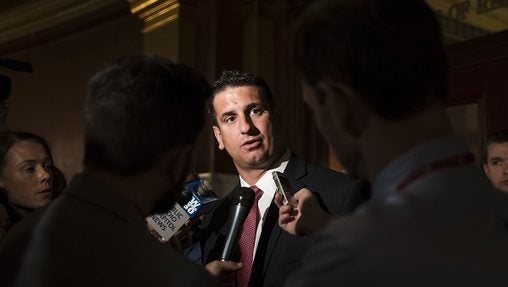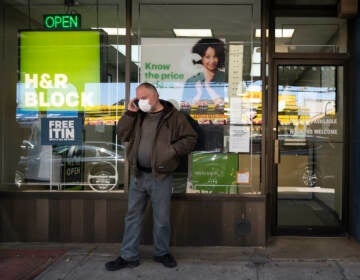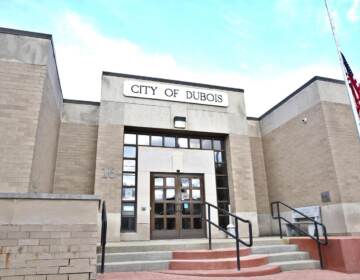House assigns blame as budget talks crash; Wolf draws ‘line in the sand’
The latest push to finish Pennsylvania’s late, unbalanced budget has melted down.
Listen 0:00
Pennsylvania House Majority Leader Dave Reed, R-Indiana (Matt Rourke/AP Photo)
The latest push to finish Pennsylvania’s late, unbalanced budget has melted down.
After several false starts, talks between House Democrats and Republicans dissolved into fights Wednesday over who’s at fault for the chamber’s inability to find consensus on a tax package.
Meanwhile Governor Tom Wolf declared himself “done” playing games, and unexpectedly announced he’ll balance a portion of the budget himself, by borrowing against future revenue from the state-controlled liquor industry.
Among the failures over the last three days of negotiations were Republican-proposed bills to tax warehouses and the hotel industry.
GOP Majority Leader Dave Reed blamed the letdown on a lack of Democratic votes — which he claimed amount to a betrayal by Democratic leaders, and by extension, Democratic Governor Tom Wolf.
“It seems to me that once again some folks can’t keep up their end of the bargain, and they looked for the easiest way to get out of town,” Reed said. “I’ll say from a personal perspective, it’s very frustrating. If I can’t take people at their word, then I don’t know how I can negotiate with them.”
House Democratic Leader Frank Dermody said that’s ridiculous.
“Anything that was done here was their idea, and we were working to get that done,” he said. “However, they didn’t. They can’t. So to call us incompetent…”
Dermody — and Governor Wolf — maintain that a natural gas severance tax is the best way forward.
But the tax bill was dealt a blow when House Democrats unexpectedly called up a resolution to discharge it from the Republican-controlled committee where it’s been stalled for months, and the motion failed decisively.
Not even the entire Democratic caucus voted for it.
As floor debate on the severance tax occupied the House’s attention, an unusually combative Wolf called a surprise press conference.
He announced he plans to patch part of the budget deficit himself, by borrowing $1.25 billion against profits from the state Liquor Control Board.
“Too many Republicans in the legislature are more focused on the 2018 elections than on helping Pennsylvania succeed,” Wolf said. “They’d rather see me fail than Pennsylvania succeed. They’d rather protect special interests, they’d rather protect lobbyists and campaign donors than do the right thing. I’m not going to play their games anymore, so I’m drawing a line in the sand.”
Wolf said the borrowed money will be about enough to pay off last year’s deficit.
Going forward, he plans to take undisclosed steps to “manage complements” and “streamline government services,” to keep the budget roughly in balance.
He placed specific blame on one caucus for making this necessary.
“House Republicans have again proven themselves incapable of completing their constitutional duty,” he said. “So I’m going to manage the finances of the commonwealth until the House sees fit to do what it’s supposed to do.”
House Spokesman Steve Miskin said Wolf should have been doing that all along.
“Good,” he said after Wolf’s press conference. “It’s three years into his administration. That’s what the job of governor is. Manage.”
Reactions to Wolf’s plan from state fiscal officers and the liquor industry appear mixed.
Both the Treasury and the Independent Fiscal Office said they don’t have enough information to assess what the securitization will do to state finances.
However, IFO Director Matthew Knittel noted that it only takes simple math to see the projected revenue won’t fully balance an expected $2.2 billion dollar budget hole — even if the state cuts out non-essential payments.
“I know in his press release they mentioned something about managing complement and finding ways to streamline government services,” Knittel said. “Even over and above that, we still think there needs to be some savings or some additional revenues.”
PLCB chairs said they haven’t discussed the idea yet. But they noted their “cash position” is strong, and pledged to “work collaboratively with the Governor’s Budget Office.”
The Distilled Spirits Council, a trade association that has previously urged Pennsylvania to expand its liquor sales, had a different take.
Chief economist David Ozgo said securitizing will probably add tens of millions of dollars in debt service payments to the control board’s already-hefty obligations.
“Obviously you’re going to have to generate more revenue, because you now have this additional expense,” Ozgo said.
The liquor securitization plan isn’t negotiated yet. Budget Secretary Randy Albright said that will take about two months.
Wolf said he wants lawmakers to keep revenue talks going in the meantime, and that he could call the borrowing off if an alternative comes together.
But several lawmakers said the governor’s plan will sap some of the urgency from negotiations.
“This doesn’t sound like a governor who actually wants to get a budget done,” Reed said. “But look, if he wants to securitize the revenues from the LCB, so be it. It beats tax increases, so we’ll accept it.”
Senate Republican Leader Jake Corman said the plan could feasibly get the commonwealth through another year — even without new revenue.
“Schools will be funded, human services will be taken care of, and this cash flow problem will be resolved, so payroll will be met,” Corman said. “For that part, the budget is complete.”
But he noted, that means there won’t be enough money to make $600 million in expected payments to Penn State, the University of Pittsburgh, and Temple and Lincoln Universities.
“What is it, a 170-year relationship with the university that we might be walking away from?” he asked. “I think that’s a profound policy decision that will have profound consequences that the people of Pennsylvania will not enjoy.”
House and Senate leaders left the door open to further negotiations, but for now, both chambers say they have to regroup.
The House isn’t due back in Harrisburg for another two weeks. The Senate has no scheduled return date.
WHYY is your source for fact-based, in-depth journalism and information. As a nonprofit organization, we rely on financial support from readers like you. Please give today.





